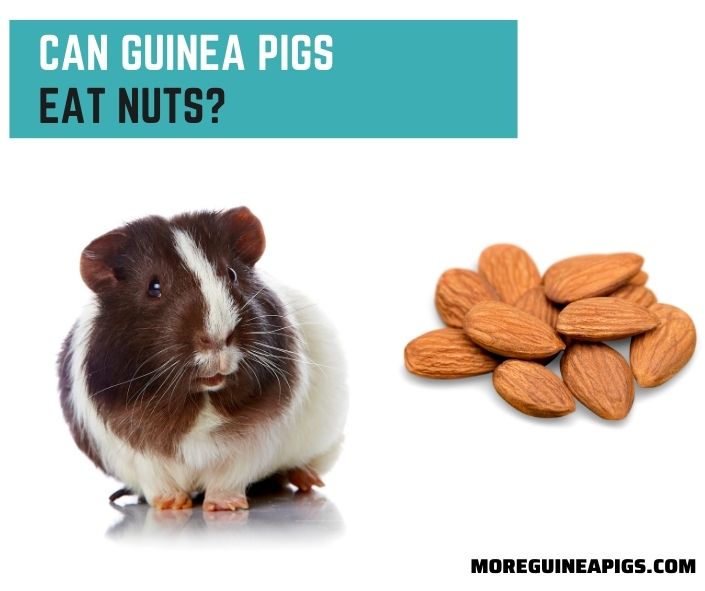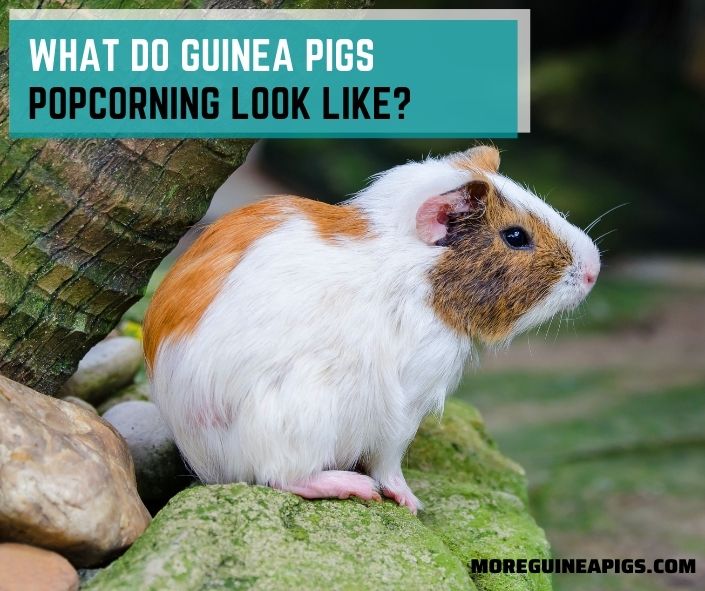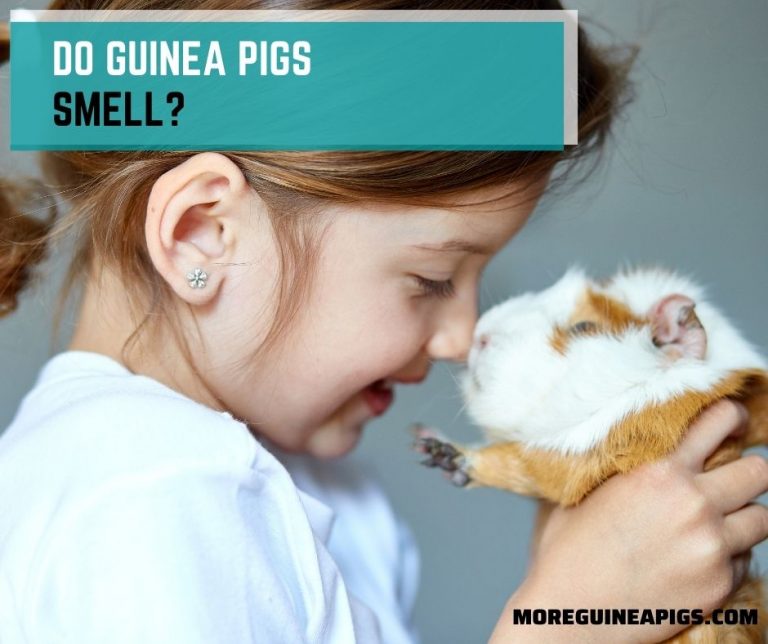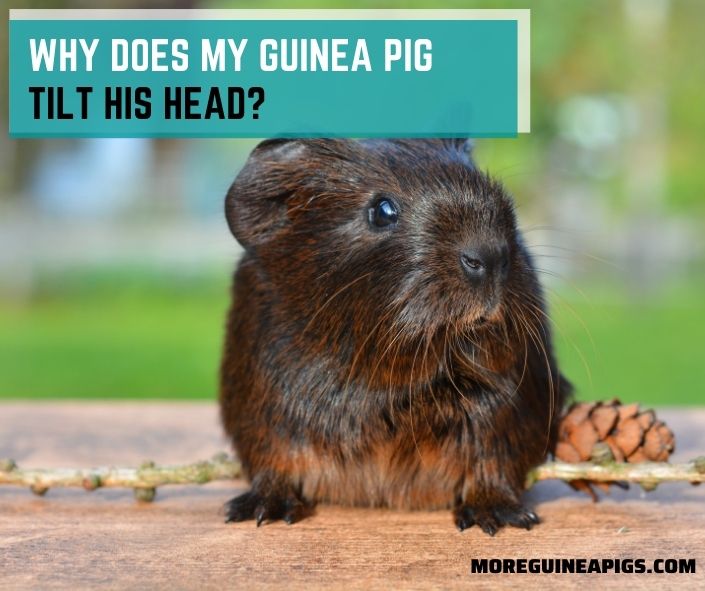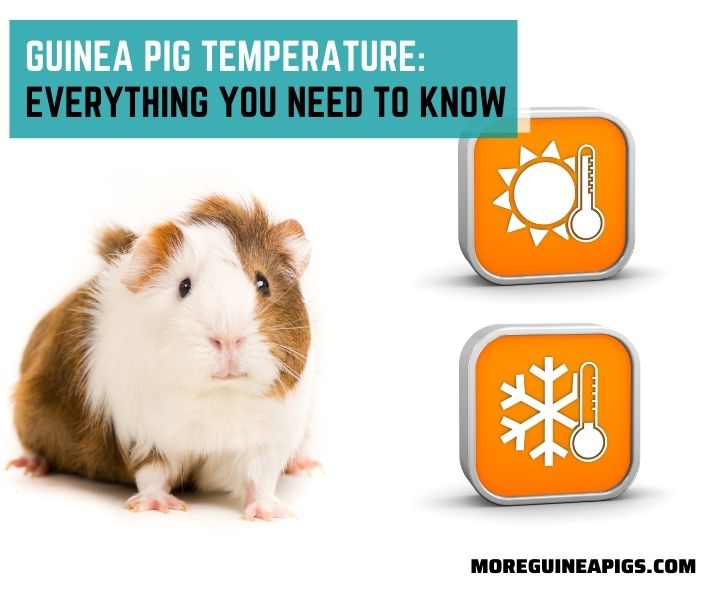Can Guinea Pigs Eat Nuts?
Many guinea pig owners wonder if their guinea pigs can eat nuts. Guinea pigs seem to love different types of nuts such as almonds, peanuts, cashews and Brazil nuts.
But are they all safe? What are the benefits and risks? In this post, we are going to discuss everything you need to know about it.
Can Guinea Pigs Eat Nuts?
Nuts are high in carbohydrates and low in fats, and that’s why it is important to be careful about the quantity of nuts your piggies consume. Nuts are not ideal for guinea pigs because these rodents are herbivores.
Nuts can also lead to some health problems such as obesity, bladder stones, and allergies. A small feeding may not cause any issue, but avoiding nuts altogether is a pretty good idea.
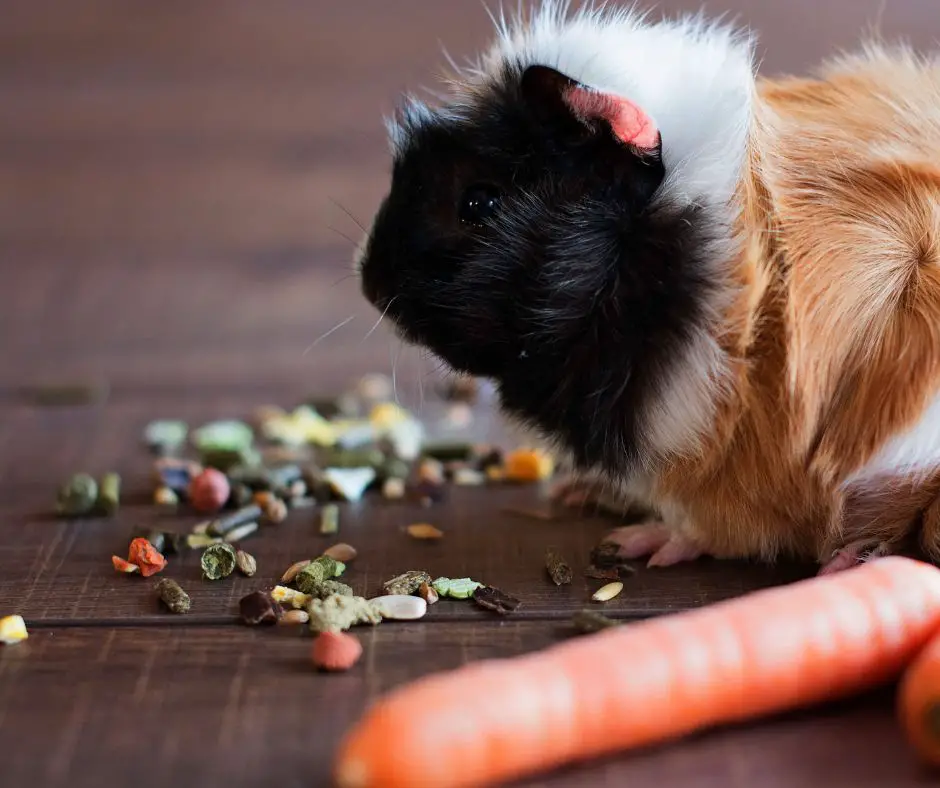
Almonds
The most notable nutrient found in almonds is dietary fiber, which aids in digestion. If fed in moderation, almonds can keep your guinea pig’s digestive system clean and healthy.
Almonds also contain vitamin E, which provides protection against oxidative damage.
However, it is important to avoid almonds with high salt contents. Almonds can also be responsible for obesity and heart attacks in guinea pigs. Also, make sure you avoid bitter almonds, because they are poisonous for guinea pigs.
Also read: Guinea Pig Ate Poisonous Plant: Symptoms and Treatment
Walnuts
Walnuts are rich in carbohydrates, protein and fats. The dietary fibers found in walnuts can aid digestion in guinea pigs. Healthy fats help keep the cardiovascular system healthy. These nuts contain vitamin C, which is very important for rodents.
However, walnuts can induce allergic reactions to guinea pigs. The sharp portion of walnuts can even cause wounds in your guinea pig’s digestive tract. Walnuts are rich in calcium, which means they can increase the risk of having bladder stones.
You should consider avoiding them altogether, because there are many better and safer sources of the nutrients found in walnuts.
Brazil Nuts
Brazil nuts contain high levels of calcium, which can cause calcium deposits and bladder stones in guinea pigs. Brazil nuts also contain complex carbohydrates, which guinea pigs find very hard to digest.
High levels of folic acid and vitamin C can weaken and damage joints. So, rather than taking risks, just avoid Brazil nuts.
Cashew Nuts
Cashew nuts are rich in ammonia and fats. They are acidic, and that is why you should offer cashew nuts to your guinea pigs only occasionally as a treat. In moderation, they are safe.
However, remember that staying away from cashew nuts altogether is a good idea. If your guinea pigs do not get cashew nuts, they don’t really miss necessary nutrients.
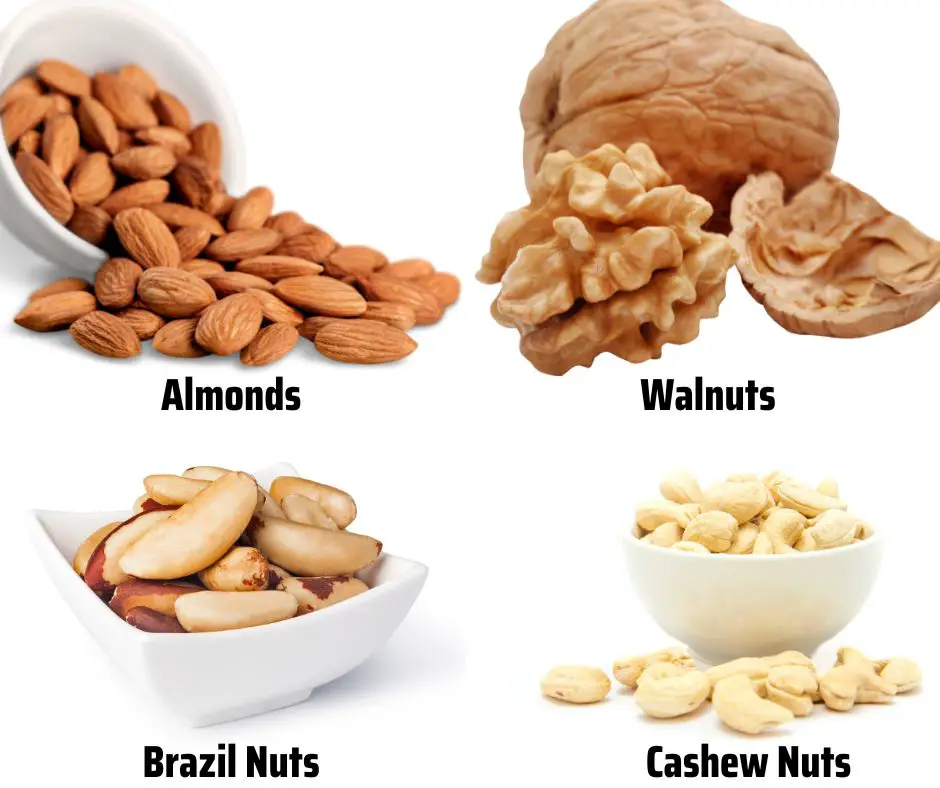
Peanut Derivatives
Peanut butter can be bad for guinea pigs, because the stuff is too sweet and sticky. Peanut derivatives can cause a host of health complications in rodents.
Do not feed roasted nuts either, because they contain too much salt. So, stay away from peanuts and peanut derivatives.
Pistachio Nuts
Pistachio nuts are not good for guinea pigs. It is true that these nuts contain nutrients such as carbohydrates, calcium and fats. They are not poisonous. But, guinea pigs simply cannot digest pistachio nuts properly. Therefore, we recommend you do not buy pistachio nuts for your piggy.
Pine Nuts
Pine nuts, which are the edible seeds of pines, are rich in calcium, fatty acids, phosphorus, and sugar. Guinea pigs cannot eat pine nuts because they are highly acidic.
If your guinea pig nibbles at one or two pine nuts, the piggy should be fine. But if the amount of consumption goes beyond that, there are risks of choking and digestive issues.
Monkey Nuts
Monkey nuts are also known as ground nuts, earthnuts, pigmy nuts, and goober peas. Monkey nuts are bad for guinea pigs because these nuts contain high levels of phosphorus, fatty acids and calcium.
One or two monkey nuts will not cause any problem. But in general, they should be avoided.
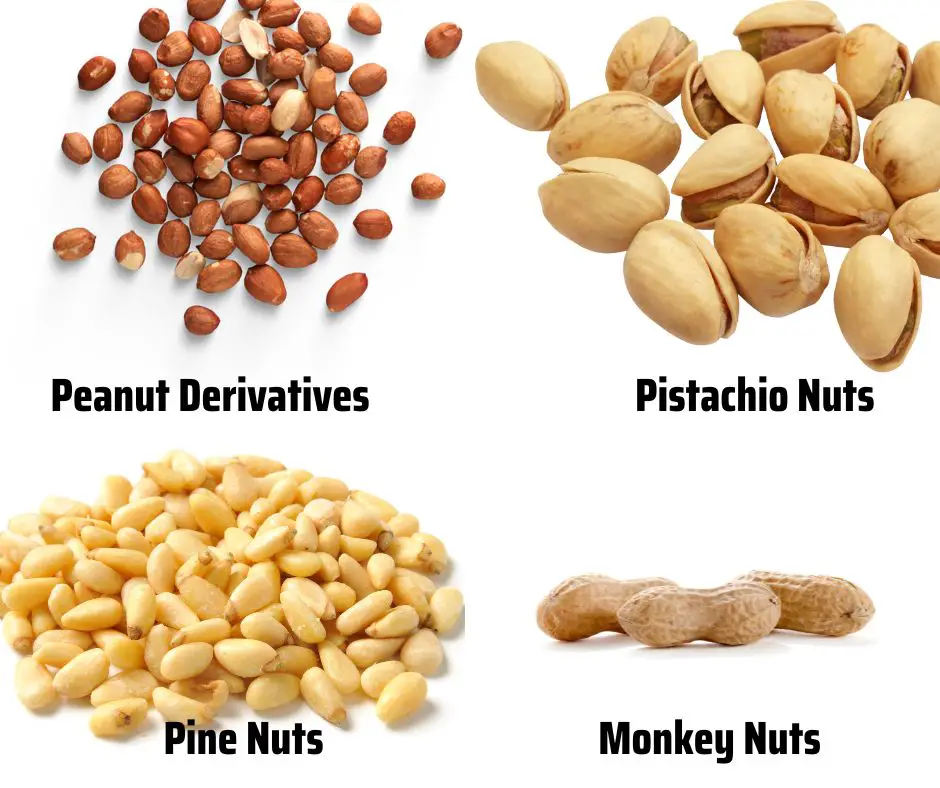
Macadamia Nuts
Macadamia nuts are rich in nutrients, and beneficial for humans. These nuts are expensive. However, no matter how tasty and expensive macadamia nuts are, they are actually unsafe for guinea pigs.
These nuts can lead to choking hazards and some long-term health issues in guinea pigs.
Corn Nuts
Generally, corn nuts are safe for guinea pigs. Your piggy can safely consume corn kernels once or twice a week. In terms of nutritional value, corn husks are similar to hay. You can feed corn husks to your guinea pigs every day.
Pecan Nuts
While pecan nuts are not toxic, they can be harmful for guinea pigs. Choking hazard is the most common risk, but there are other risks, including obesity. Just stay away from pecan nuts.
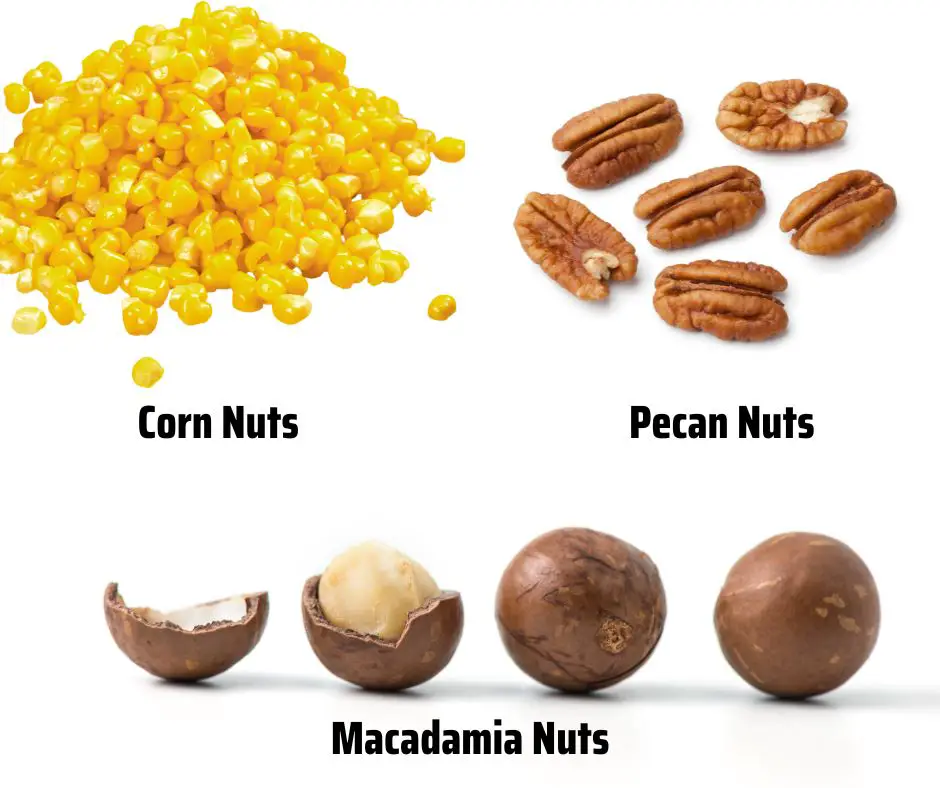
Health Risks When Feeding Nuts to Guinea Pigs
Nuts are not good for guinea pigs because these rodents cannot properly digest large amounts of fats found in nuts. There are significant health risks of feeding nuts to guinea pigs.
These risks include obesity, bad digestion and upset stomach, urinary complications, choking hazards, and allergies. While all nuts are not equally harmful, it is good to avoid nuts altogether.
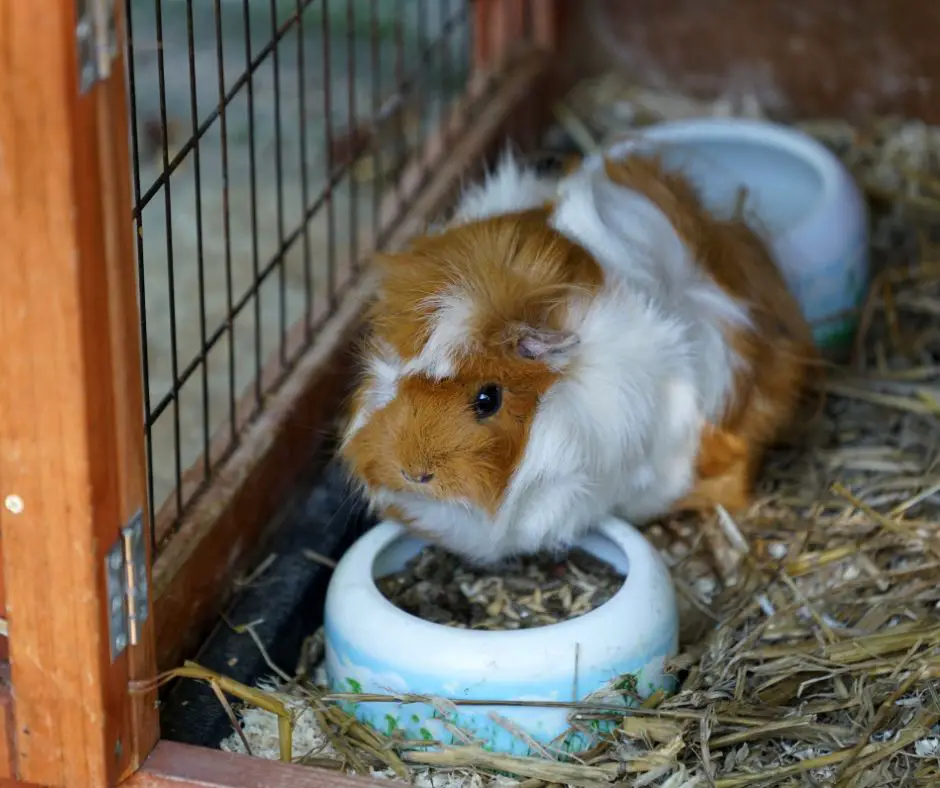
Damage to the Digestive System
Guinea pigs have a sensitive digestive system. Most types of nuts are high in complex carbohydrates and unsaturated fats that can cause digestive problems in guinea pigs.
Inconsistent intestinal mobility, which is caused by complex nutrients found in nuts, can be dangerous for guinea pigs. Consumption of nuts can quickly lead to diarrhea and serious gastrointestinal issues.
Allergies
Guinea pigs, just like humans, can be allergic to nuts. Allergic reactions are not very common in guinea pigs, and the reason is simple: most guinea pigs are not given nuts. But if you piggy eats too many nuts, chances are that allergies will flare up.
Bladder Stones
Guinea pigs are unable to process high levels of calcium found in most types of nuts. The calcium accumulates in the bladder and turns into bladder stones—a very painful condition. In some cases, these stones must be surgically removed.
Urinary Complications
Most types of nuts are rich in mineral calcium, which can cause urinary pain, blood in the urine, and recurrent urinary tract problems. If left untreated, these problems can cause kidney failure.
Also read: Guinea Pig Urinating Excessively: Cause, Treatment, and Prevention
Obesity
Nuts are calorie-dense, and contain lots of fats. They are not good for rodents. If your piggy eats too many nuts regularly, the animal may gain weight. If fat accumulates in the bloodstream, heart problems can occur.
Damage The Nervous System
Vitamin C and E deficiency can have a damaging effect on the central nervous system of guinea pigs. Guinea pigs are not capable of absorbing the nutrients found in nuts, and therefore consuming nuts can damage their nervous system.
Benefits of Feeding Nuts to Guinea Pigs
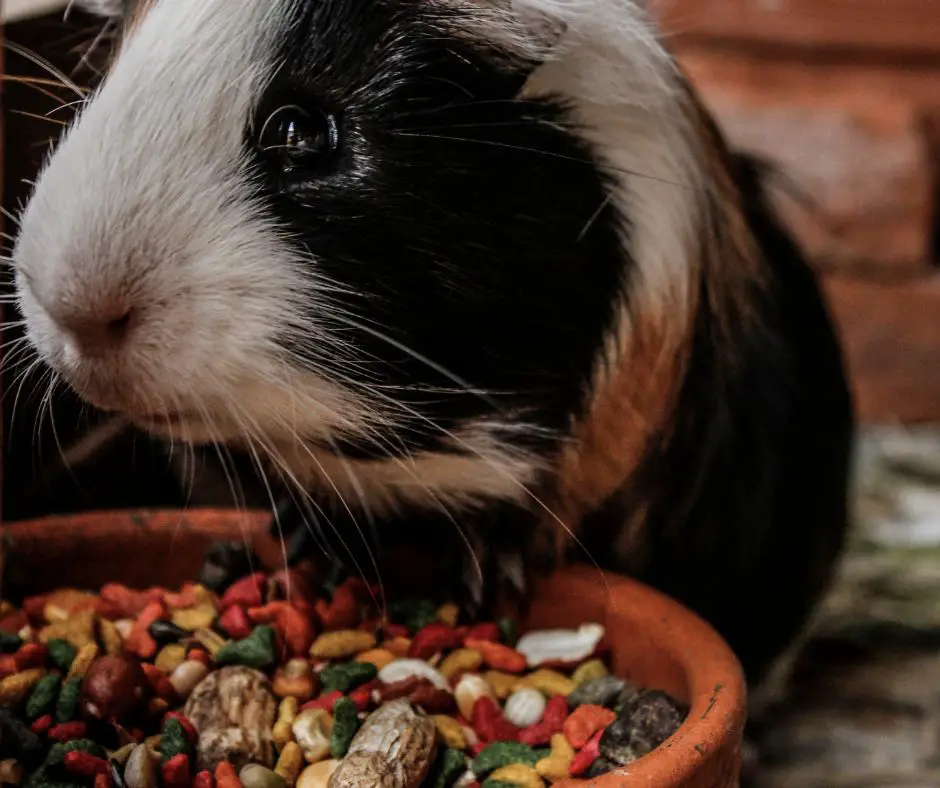
Nuts are loaded with many different types of nutrients, but most nuts are not good for guinea pigs. Should you stop feeding nuts to your guinea pigs? That may not be the best option either. Just make sure the amount of the stuff you feed is very little.
Nuts are rich in unsaturated and monosaturated fats, and other nutrients such as phosphorus, magnesium, copper, potassium, and selenium.
What Happens If Your Guinea Pig Eats Too Many Nuts?
Choking hazards, loose or watery stool, and allergies are the most common problems guinea pigs have when they eat too many nuts.
And if you keep feeding nuts without knowing the consequences, your piggy may develop some long-term health issues such as obesity, bad digestion, upset stomach, and urinary complications.
What Should You Do If Your Guinea Pig Eats Too Many Nuts?
If your guinea pig shows any signs of discomfort after consuming too many nuts, see a veterinarian immediately. Loose stool, diarrhea and allergic reactions are some issues to look for.
It is very important to visit a vet as soon as possible. Failure to do so can lead to a host of other health complications, and even death.
What Should I Feed My Guinea Pig?
Although hay is the main food for guinea pigs, these rodents can eat many different types of other food items. Here are the foods your piggy can eat safely:
- Hay: This is the most important part of your guinea pig’s diet. Make sure high-quality, fresh, clean and dry hay is available at all times. Hay aids in digestion in rodents. Guinea pigs’ teeth grow continuously, and hay helps wear down their teeth.
- Pellets: Especially formulated pellets contain balanced nutrition, which is good for guinea pigs. When buying pellet food, make sure it is approved by the relevant authority.
- Vegetables: For a grown-up guinea pig, up to one cup of vegetables is good. Guinea pigs can eat many different types of vegetables including peas, carrots, romaine lettuce, artichokes, spinach, broccoli spears, tomatoes, and kale.
- Fruits: While it is not a good idea to feed too many fruits to guinea pigs, bite-sized, small portions of fruits can be healthy. Oranges, pears, apples, blueberries, strawberries, papayas, kiwi, cucumbers, and peaches are some healthy fruits for guinea pigs.
- Treats and chews: Make sure treats do not exceed 10% of your piggy’s food intake. When buying commercially produced treats, read labels carefully, because these treats contain sweeteners that may not be good for your guinea pig’s health.
There are some foods that guinea pigs cannot eat, and it is very important to know which food items should be avoided.
Do not feed onions, chocolate, mushrooms, garlic, avocados, iceberg lettuce, potatoes, nuts, corn kernels, seeds, rhubarb, peanut butter, bok choy, cabbage, bread, dairy products, and meat.
Also read: What Can Guinea Pigs Eat? A-Z Food List
Oxbow Essentials Guinea Pig Food – All Natural Guinea Pig Pellets for Adults and Young Guinea Pigs
Summary
The bottom line is, nuts are not good for guinea pigs. While all nuts are not equally harmful, it is a good idea to steer clear of all kinds of nuts, including peanut derivatives such as peanut shells and peanut butter.
Just forget nuts! The potential downsides of feeding your guinea pigs nuts far outweigh the benefits.
